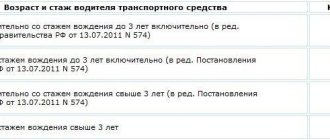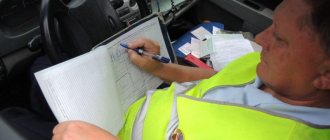It often happens that car owners, due to various circumstances, entrust the driving of their vehicle to friends or relatives. And these friends or relatives are not always sober.
Everyone is well aware that a person driving a car while intoxicated creates enormous risks not only for himself, but also for the citizens around him.
However, not everyone knows that the owner of the vehicle is responsible for entrusting it to a drunk driver.
The need to bear such responsibility, in most cases, becomes a very unpleasant surprise for a person.
What liability is provided by law?
Transferring control of a vehicle to a person who is intoxicated is punishable under Part 2 of Article 12.8 of the Code of Administrative Offenses of the Russian Federation.
The sanction of this legal norm provides:
- application of an administrative fine of thirty thousand rubles,
- deprivation of the right to drive vehicles for a period of one and a half to two years.
According to the regulations, a person deprived of a driver's license is obliged to hand it over to the territorial division of the traffic police at his place of residence within three days, counting from the day on which the court decision came into force.
If the document is not submitted, the period of deprivation is not calculated. As soon as the certificate reaches the traffic police, the countdown of the period for which the person was deprived of his rights will begin.
The administrative fine must be paid within sixty days. Allowing a person who is intoxicated or does not have a driver's license to drive a vehicle entails liability under Article 12.32 of the Code of Administrative Offenses of the Russian Federation.
Attention! Our qualified lawyers will assist you free of charge and around the clock on any issues. Find out more here.
Its sanction includes an administrative fine:
- for an official responsible for the technical condition and safe operation of transport, in the amount of 20 thousand rubles,
- for legal entities it is one hundred thousand rubles.
If the owner of the vehicle is an individual entrepreneur, then he is subject to a penalty similar to a legal entity.
Punishment for those who do not have a driving license
If a drunk driver does not have a driver's license, he can be arrested - for at most 15 days (Article 12.8 of the Administrative Code).
If this type of punishment cannot be extended to the offender, he should only count on a fine as a preventive measure, although some would rather be in prison. In case of this type of violation, 30 thousand rubles are collected in favor of the state.
Peculiarities of applying a fine for handing over the steering wheel to a drunk driver
Administrative liability for transferring the steering wheel to a person who is intoxicated occurs only if there is a voluntary transfer.
Important! This can be confirmed by:
- being in the car of the owner of the vehicle during a stop by traffic police officers,
- handwritten acknowledgment by the driver of the fact of transfer by the owner of the car.
If the owner is not in the car, then it is almost impossible to prove the voluntary transfer of the steering wheel to a drunk driver, especially with a competent lawyer.
If the fact of the owner’s presence is recorded by the information set out in the protocol on an administrative offense, then it will be difficult for such a person in a court hearing to prove that he did not know about the drunken state of the person to whom control of the vehicle was transferred.
Any attempts to shield oneself will be regarded by the court as an attempt to evade responsibility provided for by law.
He hit a pedestrian and left the scene of the accident.
Read here what to do if the loaned car is involved in an accident and cannot be restored.
Is it necessary to do a technical inspection after an accident, read the link: https://novocom.org/otvety-na-voprosy-chitatelej/nuzhno-li-proxodit-texosmotr-posle-avarii.html
The owner of a vehicle finds himself in the most difficult situation if he is brought in after a case has been considered in court to punish the driver.
Especially if the court ruling states that the owner knew about the driver’s condition and, nevertheless, handed over the car to him. In this case, liability under Part 2 of Article 12.8 of the Code of Administrative Offenses cannot be avoided.
Experienced lawyers recommend building protection for the owner of a vehicle at the stage of bringing to justice the person who is brought to administrative responsibility for driving while intoxicated. Only the exclusion of the driver's liability automatically removes the question of the liability of the car owner.
Therefore, only experienced and qualified auto lawyers will help you choose the right tactics and strategy for protecting the interests of the vehicle owner. Involving these specialists in the case at a very early stage will allow you to reliably and effectively build a defense against the charges.
There are no ready-made recipes for what to do in this or that case. Each case occurs in a specific situation, and therefore requires an individual approach and the development of a special line of defense.
Revocation of driver's license for repeated drunk driving.
Arbitrage practice
Proceedings in cases related to the deprivation of a driver's license for driving while drunk occupy a special place in judicial practice. So, for clarity, we can mention one real case.
In 2021, the scandalous trial of a driver from the Moscow region, citizen I. Vereshchagin, was completed. In 2015, he was detained by traffic police officers near his car (he opened it only to pick up things), after which he was accused of driving while intoxicated. He was threatened with deprivation of his license for 2 years and an impressive fine. At first he was found guilty. However, the defendant hired lawyers who appealed the decision and were able to prove that the defendant really did not intend to drive. As a result of these actions, the previous decision was canceled and the defendant managed to avoid undeserved punishment.
In general, it can be noted that the owner should be extremely careful about who he gives the keys to his vehicle, since if he hands over the steering wheel to a drunk person, he risks not only causing an accident with his car, but also being held accountable himself.
The process of drawing up a protocol by a traffic police officer
The fact of an administrative offense is recorded by a traffic police officer in the appropriate protocol. It indicates the essence of the violation depending on the current situation.
So, for example, the vehicle is registered to the spouse, and the husband was driving the car while intoxicated. The traffic police inspector is obliged to draw up a protocol both against the owner of the vehicle for handing over the steering wheel to a person who is drunk, and against the driver himself for driving a vehicle while intoxicated. Thus, both family members will be punished.
If the wife, as the owner of the vehicle, was not in the car, and the husband took the car while sober, then only the husband will be held administratively liable.
The wife will be able to avoid punishment, but the traffic police officers will not miss the chance to draw up a report on her. Then, in court, the owner of the vehicle will need to prove that the car was transferred to the control of a sober spouse.
When drawing up a report on driving while intoxicated or handing over the steering wheel to a person while drunk, the driver's license will not be confiscated. Traffic police officers are deprived of this right. Only after a court ruling has entered into legal force, the owner of the driving license independently surrenders his license to the traffic police.
Watch the video. How to mitigate the punishment if they want to deprive you of your rights:
How is alcohol consumption determined?
It is prohibited to drive while drunk or after taking intoxicants. These may be narcotics and other psychotropic drugs. When making an arrest, all these factors are taken into account.
When stopping a car, traffic police officers pay attention to the following things:
- The suspect smells of alcohol.
- Coordination is impaired.
- Inability to speak clearly and answer questions.
- Trembling of the driver's hands and fingers.
- Change in skin color.
- Unreasonable behavior.
There is a slight deterioration in mental activity with mild intoxication:
- A person's sweating increases.
- Redness appears on the face and neck.
- The pupils dilate.
- Heart rate increases.
- Breathing quickens.
Impaired motor function (gait changes, staggering appears when walking, instability in a simple pose, inaccuracy in performing simple movements).
If signs of alcohol intoxication were revealed during a medical examination at the place of detention, you can insist on having it repeated at the nearest medical facility. There is a fairly high probability that a different degree of intoxication will be established.
After the conclusion of a narcologist, the fact of alcohol consumption may be established, but intoxication is not recorded.
If there are grounds to detect that the permissible dosage of alcohol in the blood of a detained driver is exceeded, it may be difficult to answer the question of whether he is sober.
Fine for crossing a railway crossing on a red light
It is possible that the owner of the car was drunk when he transferred control of the car to another person. This means that he could not reliably determine how drunk his friend was, to whom he was transferring control of his vehicle.
The imperfection of the law requires amendments that will take into account situations of being in a sober state before handing over the keys. Such a document may be a certificate from a narcologist.
If a motorist is stopped and suspected of drinking alcohol, traffic police officers need to conduct a medical examination.
Additional confirmation of the drunken state of the detained driver may be the testimony of people passing by. To do this, they will need to assess the condition of the person behind the wheel and sign the protocol.
When an expert checks a drunk driver, he must conduct a breath test. Based on these and other laboratory data, a conclusion is made about the fact of alcohol consumption. When evaluating the results, we must not forget that the instruments used for testing can sometimes give false readings. This depends on non-compliance with the sampling methodology and the conduct of the study.
If the driver violated the traffic regulations and rejects the offer to undergo a medical examination, then this is considered an admission of guilt. In the case of criminal liability, this is not enough. We need real evidence. The driver should know his rights, otherwise this may worsen the situation in the case.
What are the penalties for crossing a double continuous line?
How to avoid liability for handing over the steering wheel to a drunk person
In order to protect yourself from the possibility of being held administratively liable for handing over the steering wheel to a person who is intoxicated, you should correctly document the fact of acceptance and transfer of the vehicle.
Experienced lawyers recommend drawing up a document in which the date, time, place of transfer of the car, and the sober state of the driver entrusted with driving the vehicle should be recorded.
In the future, this document will make it possible in court to prove the absence of intentional guilt or criminal inaction in the actions of the car owner.
Qualified lawyers use another argument to exclude charges against the owner of the car. They require traffic police officers to present a medical examination report stating that the driver was intoxicated at the time the keys were handed over.
The absence of such a document excludes the legal grounds for bringing the owner of a vehicle to administrative liability for handing over the steering wheel to a person who is intoxicated.
How to obtain a court order to deprive of rights?
Criminal liability
Drunk driving often causes traffic accidents that have serious consequences. Such a violation is regarded by law as criminal, therefore it is regulated not by the Code of Administrative Offenses, but by the Criminal Code of the Russian Federation. And you can get for it:
- Up to 7 years in prison - if there is one victim for whom the accident was fatal;
- Up to 9 years of imprisonment - in case of death of two or more persons;
- From 3 to 4 years of imprisonment - for causing serious harm to the health of people injured in a road accident.
For mild to moderate injuries, the offender will only face administrative liability in the form of confiscation of a driver’s license or a hefty fine. But the death of a person as a result of an accident is regarded by the court as an aggravating circumstance that has a criminal component.
If the car owner was nearby
If the owner of the car handed over control to a person who is intoxicated, and at the same time he was also in the car, it will not be possible to avoid administrative liability.
Since any explanation that the owner of the car did not know that he was handing over the steering wheel to a person in a state of intoxication will be regarded as an attempt to evade a well-deserved punishment.
The only possible option to avoid liability is to look for procedural errors on the part of traffic police officers in filing an administrative case.
Is it possible to challenge
A drunk person is unable to fully control himself and his actions. This poses a danger to both him and those around him. Especially when such a person gets behind the wheel.
If you nevertheless got into the car and were detained, you need to answer for your misdeeds. A drunk driver is a criminal.
Of course, if you have made a decision on punishment, there is a chance to challenge it in court. Depending on the quantity and availability of evidence, it is necessary to analyze whether punishment can be avoided. For this type of litigation, it is better to use the services of a lawyer or lawyer. Depending on the complexity of the case, their work requires payment, sometimes considerable. But criminal liability is probably worse than wasting money on a lawyer. Here everyone decides for himself.
If a person is innocent and traffic inspectors slander him by mistake, his innocence will be much easier to prove.
What to do if the owner of the vehicle was not in the car?
If a vehicle was detained for being driven by a driver who was intoxicated, traffic police officers will attempt to call the owner of the car to the place of detention. The goal is to draw up a protocol for handing over the steering wheel to a drunk driver.
Remember! Since it is quite difficult to prove the fact that the steering wheel was handed over to a drunk driver, the owner can use the following arguments to justify himself:
- The driver showed no visual signs of intoxication. A medical examination report for intoxication was not drawn up, so the owner had no reason to assume that the driver was drunk,
- the driver took the car without the owner’s permission because he had access to the keys or committed theft. That is, the car left the property without the will of the owner,
- excluding the fact that the driver was drunk is tantamount to the absence of an administrative offense,
- the car is a common shared property, despite the fact that it is registered in the name of one of the spouses. Therefore, the second spouse can drive the car without the prior consent of the owner.
A vehicle driven by a person in a state of intoxication is detained. The driver is removed from driving it. And the car itself is placed in the impound area.
When you cannot transfer control of transport to other drivers
Transferring control of a car to another person at the everyday level occurs quite often and, in itself, is not a violation. However, you should always make sure that the driver can drive the car. Two parameters are controlled:
- Possession of a driver's license. An exception is when teaching a new driver to drive.
- The driver's physical ability to control the vehicle. He should not be tired, under the influence of drugs that slow down the reaction, or alcohol.
In addition, it is prohibited to transfer the steering wheel to a driver who is not included in the MTPL policy. For this violation, a fine of 800 rubles is provided if there is no insurance at all, and 500 rubles if there is some, but the driver is not registered there. The person who transferred control to such a driver may be fined 3 thousand rubles.
Proceedings regarding the revocation of a driver's license
After the traffic police officer formalizes an administrative case, the procedure of which includes not only drawing up a protocol, but also testing the driver with a breathalyzer or sending him to a medical facility to undergo a medical examination for alcohol intoxication, all materials are submitted to the court. Only the court has the right to apply one or another type of punishment.
Payment to the insurance company if the person at fault for the accident is drunk.
If a driver detained for driving while intoxicated, or a vehicle owner who handed over the steering wheel to a drunk, ignore a summons to a court hearing, this may be perceived as an admission of guilt. Therefore, the court will automatically issue a ruling on administrative liability.
Our experienced lawyers recommend not to ignore subpoenas. It is better to enlist the help of a specialist than to be deprived of your driver's license.
Watch the video. How to protect yourself when transferring control of your car to another person:
The concept of "alcohol intoxication"
According to legal assessment, alcohol intoxication is considered to be the use of any intoxicating substances that contain ethyl alcohol in a ratio of more than 0.16 mg/1 liter. It can be:
- Beer (including low alcohol);
- Vodka, moonshine;
- Cognac;
- Kvass;
- Rum, gin, cider, etc.
But from the point of view of Article 12 Part 8 of the Administrative Code, the traffic police inspector can issue a decision to the driver only if there is 0.35 ppm in his body, identified during a medical examination (breathalyzers with a straw do not always give a reliable result, and therefore to confirm the citizen’s condition medical diagnostics are often used). The basis for such a check is usually visual signs that indirectly indicate that a person has consumed alcohol:
- Slurred speech;
- Impaired coordination of movements;
- Characteristic smell.
It is important to know! It is worth noting that the last criterion betrays the driver even the next day after drinking alcohol. What is the punishment for drunk driving in 2021, in accordance with the administrative code, we will find out from the article below.
What regulations stipulate the situation?
Responsibility for an unlawful act is determined by judges on the basis of Art. 12.8 Code of Administrative Offenses of the Russian Federation. This suggests that highway patrol officers do not impose any penalties.
They only record the offense and send documentation with evidence to the traffic police departments. From there, the collected case is transferred to the courts (magistrate court).
Punishment may include not only monetary penalties, but also removal from driving a vehicle for a certain period of time.
If a person was allowed to drive a car while intoxicated, then he faces punishment as prescribed in the following legal acts:
| Administrative | 12.8 Code of Administrative Offenses of the Russian Federation |
| Criminal | Articles 264 and 264.1 of the Criminal Code of the Russian Federation |
And the prohibition on the act of allowing a drunk person to drive a car is indicated in the Traffic Regulations (Road Rules) - clause 2.7. In addition to alcohol intoxication, there are also drug effects, fatigue, or ill health of the person entrusted with driving the car.
In all of these listed cases, it is prohibited to let the car be driven. This also includes situations when someone who wants to drive a car while drunk does not have a driver’s license with him. Or you have rights, but are open to a completely different category of vehicle.










